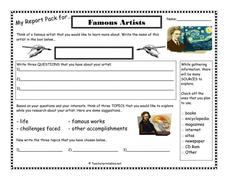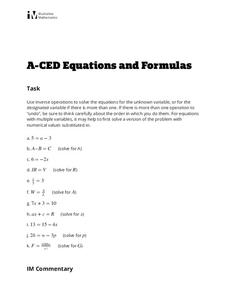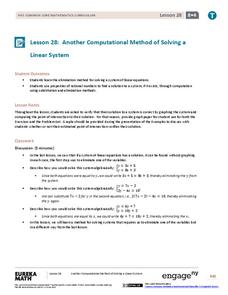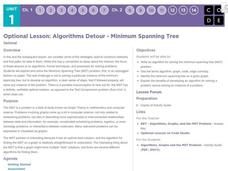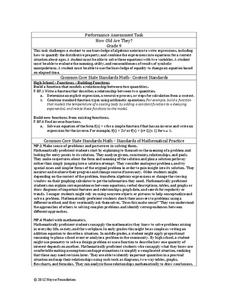EngageNY
Creating Division Stories
Create your own adventure story ... well, not really. The fifth lesson in a 21-part series has pairs create story contexts for division problems. The lesson presents a step-by-step process for pupils to follow in writing such stories.
Serendip
Understanding How Genes Are Inherited via Meiosis and Fertilization
Bring the excitement of genetics to scholars with a dynamic hands-on meiosis modeling experience. During the activity, biologists follow step-by-step procedures to build chromosomes, model independent assortment, learn about crossing...
Sea World
Marine Animal Husbandry and Training
Step into the role of a zoo director with several activities about animal training and running a zoo. Kids calculate the amount of food each animal needs, design a habitat for penguins, decide how to breed bottlenose dolphins, and train...
Teacher Printables
My Report Pack for... Famous Artists
Famous artists are fascinating, and learners will explore one of their choice using this report pack. Working their way through this template, they write three questions about the artist they are researching, check off types of reference...
Illustrative Mathematics
Equations and Formulas
Your class is asked to use inverse operations to solve eleven equations for unknown variables or to rearrange formulas to highlight a quantity of interest. By using the same reasoning as solving one- and two-step equations, algebra...
EngageNY
Another Computational Model of Solving a Linear System
The process of elimination really works! Use elimination when substitution isn't doing the job. The 29th segment in a series of 33 introduces the elimination method to solving linear systems. Pupils work several exercises to grasp the...
EngageNY
Exploiting the Connection to Trigonometry 2
The class checks to see if the formula for finding powers of a complex number works to find the roots too. Pupils review the previous day's work and graph on the polar grid. The discussion leads the class to think about...
Code.org
Algorithms Detour - Minimum Spanning Tree
This optional lesson plan introduces the class to the idea of a minimum spanning tree. The activity focuses on determining an algorithm that will find the most efficient path in a network to transfer data.
EngageNY
Modeling a Context from Data (part 2)
Forgive me, I regress. Building upon previous modeling activities, the class examines models using the regression function on a graphing calculator. They use the modeling process to interpret the context and to make predictions...
Curated OER
Properties of Logarithms
In this logarithm worksheet, students describe the steps in solving logarithm problems. They determine the value of given logarithms and justify their answers. This three-page worksheet contains 7 problems. ...
Tech Museum of Innovation
Ant-Man Saves the Day
Provide Ant-Man with a flying device to aid in fighting crime. The first installment of a five-part unit has learners designing and building a flying device for Ant-Man. They write a narrative essay describing the engineering process...
Curated OER
Making the Most of Primary Sources: The Successful Interview
In this interviewing skills instructional activity, students read a 2-page outline of tips for conducting interviews as part of the research process and then use the tips to interview someone.
Curated OER
Writing an Information Paragraph on a Villain
In this villain worksheet, students fill out facts sheets, information planning sheets, and more to write an information paragraph on a villain. Students complete 5 activities.
Inside Mathematics
Conference Tables
Pupils analyze a pattern of conference tables to determine the number of tables needed and the number of people that can be seated for a given size. Individuals develop general formulas for the two growing number patterns and...
Inside Mathematics
How Old Are They?
Here is a (great) lesson on using parentheses! The task requires the expression of ages using algebraic expressions, including the distributive property. Pupils use their expressions to determine the individual ages.
Curated OER
Shelling a Pecan
In this pecans worksheet, 3rd graders fill out a graphing organizer sequencing how someone shells a pecan. Students also draw someone shelling a pecan and write a story about it.
Curated OER
Raven Chapter 11 Guided Notes: How Cells Divide
Take your advanced biology learners across the great divide: where cells divide, that is! Although it was created as a chapter reading guide, having your class complete this worksheet is not only appropriate, but also highly valuable in...
Inside Mathematics
Hexagons
Scholars find a pattern from a geometric sequence and write the formula for extending it. The worksheet includes a table to complete plus four analysis questions. It concludes with instructional implications for the teacher.
Curated OER
Problem Solving Decision: Multistep Problems
Capture your learners' attention by asking them to find the difference in size between the 12-inch silky anteater and the 6-foot giant anteater! This order of operations worksheet has students first identify the meaning of finding the...
Houghton Mifflin Harcourt
Family and Friends: Extra Support Lessons (Theme 4)
Family and Friends is the theme of a unit offering extra support lessons. Follow each lesson plan's teach, blend, guided practice or practice/apply routine to reinforce concepts such as clusters, responding to reading, drawing...
Curated OER
Algebraic Equations
In this algebraic equations worksheet, students solve and complete 4 different sets of problems that include solving for variables and using ratios. First, they solve for a variable and write out all of the steps in the process. Then,...
Curated OER
When I Publish
In this language arts instructional activity, students are led through the writing process and they make notes for each step to describe their own work.
Curated OER
Ratiocination
Writers use the four steps outlined here to edit their own or a peer’s paper. Using different colors of highlighters, editors note “to be” verbs, examine the length of sentences, box the first word in every sentence, and mark instances...
Ohio Center For Law-Related Education
Four Activities: Thurgood Marshall and the Nomination and Confirmation of Federal Judges
The process of nominating and confirming federal judges can sound like a lot of bureaucratic hoops, but a resource breaks down the steps of the Supreme Court nominations in a simpler manner. Learners participate in four activities that...





